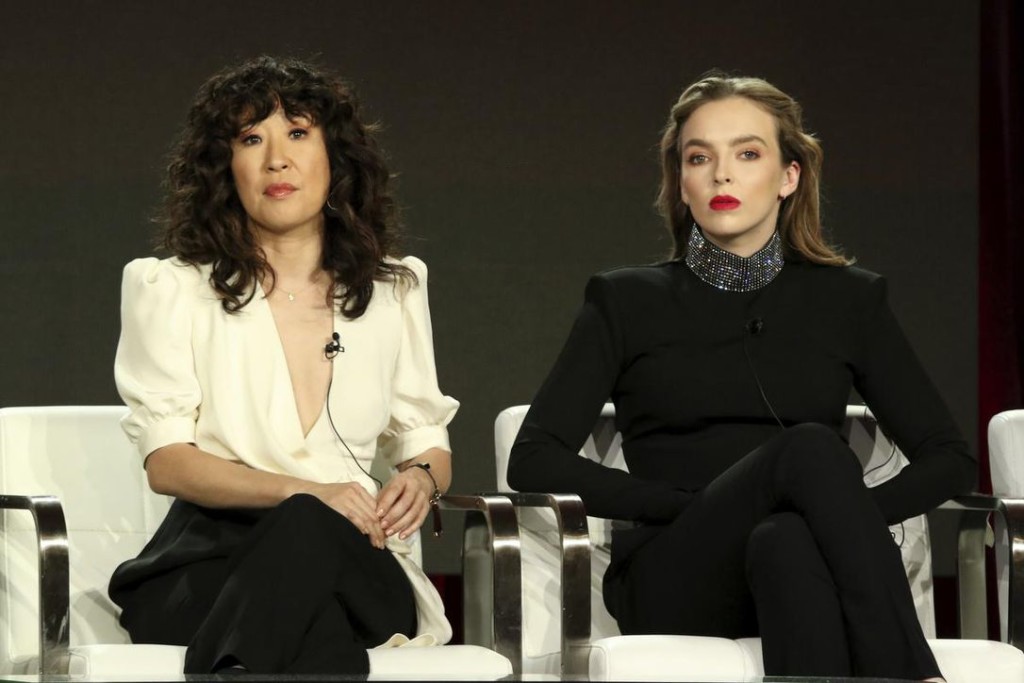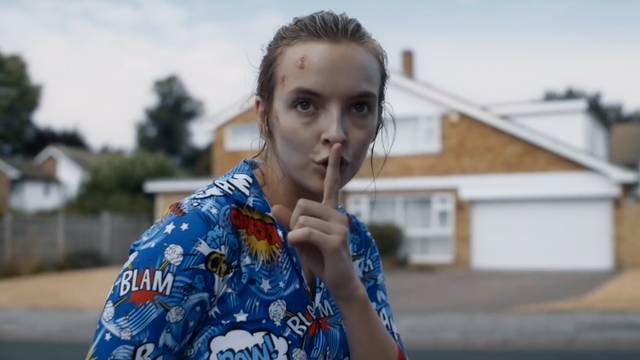Genre: TV/One-hour Drama
Premise: A low-level MI5 operative is tasked with looking into a murder orchestrated by a female assassin.
About: Today’s show has an unexpected Star Wars connection. It was created by Phoebe Waller-Bridge, who many people know as the voice of the doomed L3-37, Lando’s favorite droid, in the movie, “Solo.” Killing Eve has become one of the few shows to rise above the tens of millions of shows being produced, and I plan to find out why. The show has been such a hit that it landed Waller-Bridge a rewrite gig on, get this, the latest Bond film! How many female writers can say they’ve written a Bond film? My guess is not a lot. The second season of Killing Eve debuted a couple of weeks ago. But because I’m behind the times, I’ll be reviewing the pilot episode for the series.
Writer: Phoebe Waller-Bridge
Who knows what TV is anymore??
I don’t.
Mini-series, short seasons, limited engagements, anthologies.
The format seems to be getting less defined by the day.
For awhile, that was exciting. And yet with more TV show choices than ever before, I can’t find a single show to watch.
I stopped watching Game of Thrones a few seasons ago. One too many serious talking scenes in small rooms for my taste. Although I enjoyed looking at the pretty costumes.
While a couple of shows have caught my interest since then, The Bodyguard and Escape at Dannemora being the two most memorable, I lost interest during the second episodes. The prospect of settling in for an endless second act felt more like an exercise in masochism than entertainment.
The last two shows I watched where I genuinely had to see the next episode as soon as the current episode was over, were 13 Reasons Why and The Karate Kid. That’s a whole year without a show to get hooked on!
What’s going on? Has spreading the TV writing industry so thin destroyed any chance at getting quality written episodes anymore? You figure that has to play a part in at least some of this.
The only TV series I’m looking forward to at the moment is The Mandalorian. And that has less to do with how the show looks than it does it being Star Wars.
One show that keeps needling me to watch it is Killing Eve. I gave it a shot a few months back but I fell asleep during the pilot. Not a good sign. But there’s no denying the show has become a legitimate hit. And there’s one particular screenwriting lesson Killing Eve teaches that’s so important, I decided to watch it again, if only to share this lesson with you! We’ll cover that in a minute. But first, let’s break down the plot for the pilot.
Eve is a low-level American MI5 agent working in London whose loosey-goosey approach to her job doesn’t jibe well with her uptight British counterparts. During an important meeting about an assassination in Vienna, Eve offers her opinion on the situation without being asked. Her take is that whoever killed this dude must’ve been a woman because she was able to get close without him suspecting anything. Their response: Thanks but we got this covered.
Eve, convinced she’s right, seeks to talk with the only witness to the murder, the victim’s Polish girlfriend. Unfortunately, because the woman is Polish, she’s wasted, and therefore unintelligible. Meanwhile, we meet Villanelle, the assassin who took out the dude in Vienna. After she kills a poor old man in Italy who I’m assuming did something bad, her handler informs her that the Vienna assassination witness (the girlfriend) could cause trouble down the line. So Villanelle must kill her, too.
Back to Eve, who’s informed by her co-workers that they screwed up. New evidence proves it WAS a woman, and that she’ll probably come after the Polish girlfriend, who’s currently in the hospital. So Eve goes to watch over her, but while she’s in the bathroom, Villanelle comes out of one of the stalls in a nurse’s outfit! She has no idea this is the killer and watches as she leaves. Minutes later, when she returns to the girlfriend’s room, she, along with several other hospital workers, have been brutally murdered! Game on!
So what is this mythical screenwriting lesson you cannot succeed without?
It’s something we’ve talked about before. And yet, there probably isn’t a more commonly made mistake in screenwriting.
Are you ready?
WHAT ARE YOU BRINGING TO YOUR CONCEPT THAT IS DIFFERENT FROM WHAT WE’VE SEEN BEFORE?
That’s it. That question can save you years of heartache. I see so many writers, especially young writers, make this mistake over and over again, even after I’ve brought it to their attention. I suspect part of it isn’t their fault. When you’re young, you haven’t watched as many movies and shows. So you’re not even aware when you’re giving us something familiar.
But it’s getting harder to use that defense. We live in a time when you can easily look up if someone has written a movie/show similar to your idea.
Assuming a writer does their due diligence, knows their film history, has researched to make sure no one else has done their idea (at least not how they plan to do it), yet their idea STILL isn’t fresh, it’s an issue of not understanding how to tweak ideas to bring something new to them. Their “something new” is too lateral. It needs to be elevated.
For example, if you’d just seen John Wick and you went and wrote a screenplay about a hitman who takes down a Russian mob cell… but unlike John Wick, your hero was more of a joke-cracker, like John McClane, would that be enough of a change to warrant a “fresh” stamp? I would say no.
With that said, the line where “stale” ends and “fresh” begins is admittedly hard to nail down. If it were clear, we’d all be millionaires. There is an art to finding that line. Ideally, you want to be just far enough over where what you’ve given us is familiar, but not so far that it’s inaccessible. Sense 8, the Wachowski show on Netflix, was certainly unique. But it was so far over that comfort line that general audiences didn’t know what to do with it.
Killing Eve gives us the familiar, a tag-team assassin vs. agent concept, but places two women in the lead roles. Normally, I don’t think gender-swapping roles is enough. But in this case, it’s clever in that both parts have been given to women in an arena that has never seen that before. Like, ever. We’ve had female assassins and female agents, but never as the principle characters in the same show. A big reason I became curious about the show is that I saw a poster with both of them on it and instantly thought, “I haven’t seen that before.”
I admit there’s no way to measure exactly where that conceptual sweet spot lies. But just by asking yourself the question, you are a million times more likely to create something fresh. Because the large majority of writers out there are rewriting their favorite shows/movies and slapping a new title on them.
Obviously, getting the concept right is only half battle. You still have to execute it. And this is where Killing Eve really shines.
Waller-Bridge gets all the important things right. When we meet our characters, they perform actions that immediately tell us who they are. If you’re not doing this in a TV show, stop writing and go read a screenwriting book. This is Screenwriting 101 here, folks. When we meet Villanelle, she’s in an ice cream shop, she smiles at a little 10 year old girl who’s eating ice cream across from her, and then, when she leaves, she discreetly slaps the bowl of ice cream onto the girl’s lap. We know who Villanelle is within 90 seconds.
Ditto with Eve. One of the easiest ways to convey who someone is quickly, is to contrast their actions with other characters in the scene. So Eve comes to a meeting. Everyone is uptight and methodically going through the day’s schedule. Meanwhile, Eve is leaned back, loudly unpacking a croissant from a bag that she then chows down on.
Some writers frown upon this over-the-top introduction of characters but, I’m telling you, if you try to be too clever and subtle, we’re not going to know who your characters are. I’ll prove this to you once and for all. Think about your favorite characters of all time in movies or TV shows. The ones that left a huge impact. Got it? Okay, now go back to their introductory scene in that movie/show. I’m betting they did something pretty powerful right away that established them as a memorable character, right?
Another key thing you want to do, especially in TV shows, is create contrast between your main pairing. If your two leads are too alike, you’re screwed. You’re better off leaning towards polar opposites than slightly different. Villanelle is an icy sociopath. Eve is a goofy ball of fun. The only time I’ve ever seen the “too alike” thing work was in the sitcom, Frasier. Frasier and Niles were very similar. So I guess it can be done. But I wouldn’t go there.
I liked Killing Eve. I don’t know if it impressed me enough to seek out a paid second episode. I would probably keep watching if it was on Netflix though. Maybe that should be a new selection in my rating options. “Would keep watching if it was on Netflix.” Anyway, if you’ve seen the show, be sure to share your thoughts!
[ ] What the hell did I just watch?
[ ] wasn’t for me
[x] worth the watch
[ ] impressive
[ ] genius
What I learned: I think it’s important in TV to establish right away that you’re willing to go to places other shows aren’t. The worst thing you can do is create a comfortable story. Comfortable is boring. So by throwing something harsh at the reader right away, you let them know that things aren’t going to be business as usual. At the beginning of Killing Eve, Villanelle slaps a bowl of ice cream on a little girl. It’s jarring. It’s unexpected. It puts us on notice that the unexpected could happen at any moment in the next hour. That makes us want to keep watching.



